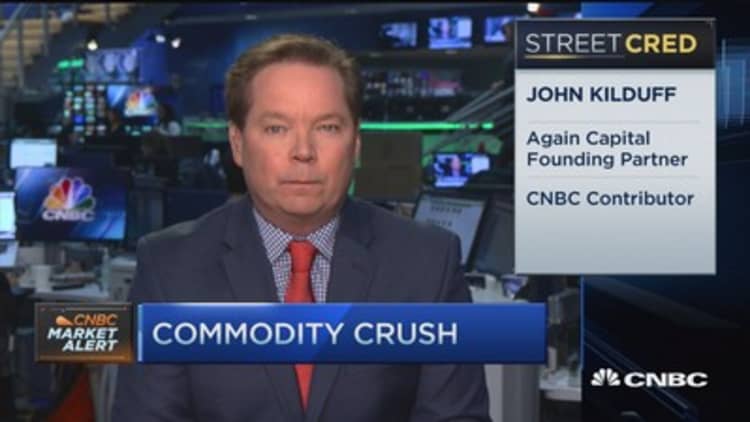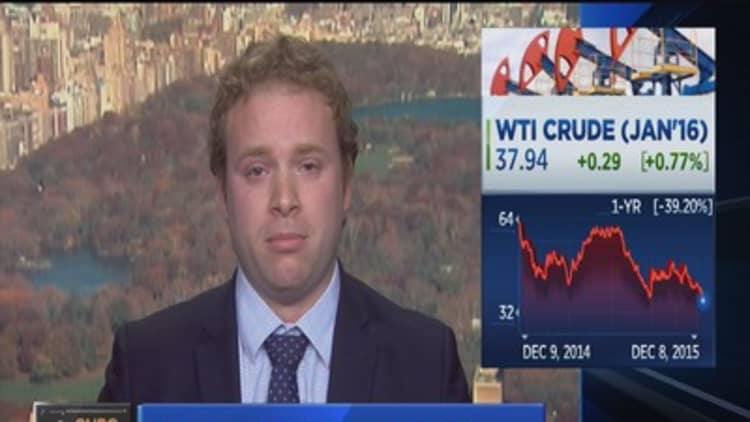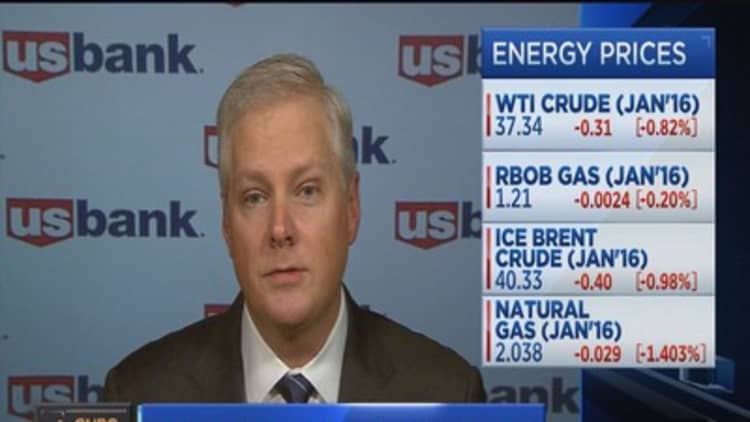


The collapse of the housing bubble sent the world spiraling into recession. The collapse of the energy and commodity bubble threatens to be just as damaging.
That few are willing to even use the term "bubble" with regard to the boom and bust in the price of oil, copper, iron ore, and other materials tells how early we still are in the painful unwind phase.
As with housing, there was a fundamental reason for these prices to soar. China has been on a historic commodities binge as it doubled the size of its economy in recent years to become one of the world's largest. Even so, those fundamentals begat—as they have so often throughout human history—a feeding frenzy.
That frenzy of financing, mining, fracking and dealmaking exacerbated the boom and now, the bust as China's growth and appetite for such raw materials has slowed dramatically.
The collapse of this apparatus is already proving deeply painful for the world economy.
This year will mark the slowest global growth pace since the 2008-09 financial crisis sparked by the housing market's collapse. Following several downgrades, the International Monetary Fund now expects growth of just over 3%. The IMF has also lopped 2.25 percentage points off its growth forecasts for the next three years for commodity exporters compared with the past three.
Among those, Russia is in a deep downturn. Brazil, a key commodity supplier, has collapsed into its likely worst recession since the 1930s, exacerbated by the political graft scandal that has been revealed in its wake. Venezuela, whose socialist government relied heavily on oil-funded payouts, is now considered the world's worst-performing economy by the International Monetary Fund. Saudi Arabia, the world's top oil producer, is tapping debt markets for the first time since 2007 to shore up its heavy cash flow needs.
That America's economy is among the least directly damaged by this unwind does not mean the country will escape unscathed.
In fact, this crisis may tear just as dramatically at its social fabric.
Read More I see oil bottom higher than I did before: Analyst
There is, for starters, the slowdown in world trade that is already damaging profits everywhere from the big corporate multinationals (and smaller companies, like Macy's and Tiffany, especially exposed to tourist dollars) to regional ports and transportation providers.
There is also the larger instability this energy and commodity collapse has triggered. Russia's leader, Vladimir Putin, has managed to retain high approval ratings despite his slumping economy by seizing Crimea from Ukraine and participating in the Syrian war that is destabilizing the Mideast and increasingly, Europe and the West. Saudi Arabia and Jordan, among the stabler Mideast nations, are being watched carefully for fear their political collapse could exacerbate the conflagration.
Nor is that conflict remaining a regional one, as demonstrated by the slaughter in San Bernardino, Calif., that was seemingly Islamic State-inspired. That, plus the sharp response from some politicians, like presidential hopeful Donald Trump, to the Muslim faith and to the U.S.remaining open to immigrants and refugees is as much of a pull on America's social fabric as was the financial crisis.
And as with the housing-triggered financial crisis, society will be desperate for scapegoats to blame for the wreckage it sees. Keep in mind that oil prices, to take the key commodity of this global crisis, do not yet appear to have bottomed. You'll know they've bottomed when the handcuffs come out.
Read More The oil bottom is in when the handcuffs come out
To understand this as a bubble that has now burst at least helps to understand what the energy and commodity collapse has unleashed across the globe. There are upsides too: Venezuela just may get a freer and more prosperous economy, Western consumers and producers get relief from high energy costs, and so forth.
Indeed, Federal Reserve chair Janet Yellen herself has said that "on balance, I would see these developments as a positive for the standpoint of the U.S. economy," in that lower oil prices is "certainly good for families, for households. It's putting more money in their pockets."
As to whether that money is going towards weapons Americans are buying to defend themselves, that perhaps is a not-so-separate matter.


